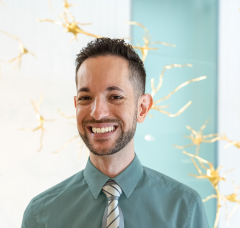Language is our main tool for transferring thoughts from one mind to another. The BlankLangLab studies the mental processes that make language comprehension possible, and the relationship between these linguistic mechanisms and the rest of the human mind.

Language is unique to humans: whereas other animals can communicate, their communication channels do not possess the same complex structures, systematic operations, or expressive power of human language. In addition, language is universal across human cultures. Therefore, the ability to process language is a central defining feature of the human mind. Elucidating the mental mechanisms that make language comprehension possible will help us understand what it means to be human.
Language comprehension feels effortless, but its ease belies the underlying complexity of the problem. If you don’t believe me, think of how difficult it has been to build intelligent computers that understand language; I think that no current artificial system comes close to processing language like humans do. So how do we do it?
Comprehension involves many tasks: identifying individual sounds / written characters / visual signs; putting them together into words; retrieving the correct meaning of each word from memory; combining words to form sentences; and much more. Our group studies how this work is divided across distinct parts of the human mind. Which sub-components of comprehension get their own dedicated cognitive machinery? Which sub-components instead rely on a shared, common set cognitive resources? How do different mechanisms interact? And what kinds of “mental objects” do they create?
Beyond the mental operations and structures that constitute “comprehension”, our lab also studies the place of language within the broader architecture of the mind. We investigate the relationship between language and other mental abilities like fluid intelligence (IQ), social cognition (thinking about other people’s thoughts), common sense (what we know about how the world works), and episodic processing (integrating different aspects of our experience into an “episode” or “narrative”).
To study these questions, we use a variety of methods: cognitive neuroscience, machine learning, computer simulations, and behavioral studies. In contrast to traditional, experimental tasks that artificially study “language in the lab”, we emphasize paradigms that are naturalistic (such as passively listening to stories), and mimic “language in the wild” by engaging the vast space of mental processes required for everyday comprehension.
In seven words: I want to understand how humans understand.
Bio: Idan A. Blank was born in Israel, where he nearly completed an accelerated MA program in theatre directing, but somehow ended up getting an MA in Psychobiology instead. He then moved to the US East Coast, for his PhD and postdoctoral training in Cognitive Science at MIT. After 8 Bostonian winters, he was enthusiastic to graduate to the West Coast and join UCLA’s Psychology Department in 2019. He also holds an appointment in the Linguistics Department, and is a member of the Brain Research Institute and the Neuroscience Interdepartmental Program. To learn more about his work, follow @ibandlank on Twitter!
Category: Spotlight
